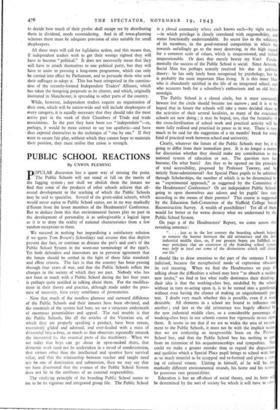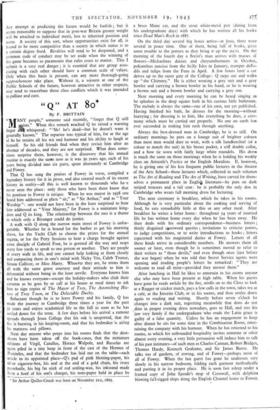PUBLIC SCHOOL REACTIONS
By UNWIN FLEMING
pOPULAR discussion has a queer way of missing the point. The Public Schools will not stand or fall on the merits of the fagging system ; nor shall we abolish them the instant we find that some of the products of other schools achieve that all- round development in the teaching of which the Public Schools may be said to specialise. Several of the grant-aided chools, which would never aspire to Public School status, are in no way markedly d'fferent from the lesser members of the Headmasterst Conference. But to deduce from this that environmental factors play no part in the development of personality is as unforgiveable a logical lapse as it is to deny the reality of national characteristics from a few random exceptions to them.
We succeed in nothing but jeopardising a satisfactory solution if we quote Tom Brown's Schooldays and assume that that depicts present day fact, or continue to discuss the pro's and con's of the Public School System in the worn-out terminology of the 1930's. Yet both defenders and innovators are in perverse agreement that the future should be settled in the light of these false standards and effete criteria. The fact is that the country has been. passing through four years of war, and that the Public Schools reflect the changes in the society of which they are part. Nobody who has not been in touch with a Public School during the last four years is perhaps quite justified in talking about them. For the modifica- tions in their theory and practice, although made under the pres- sure of necessity, have every semblance of permanence.
- Now that much of the needless glamour and outward diffidence of the Public Schools and their inmates have been obviated, and the essentials of the system laid bare, we see a structure underneath of enormous potentialities and appeal. The real trouble is that the Public Schools, like all the articles of the Victorian era, of which they are properly speaking a product, have been ornate, excessively gilded and adorned, and over-loaded with a mass of distasteful bric-a-brac, so much so that observers repeatedly mistook the inessential for the essential parts of the machinery. When we see today that boys can go about in open-necked shirts, that
domestic work need not be undertaken in a mood of condescension, that virtues other than the intellectual and sportive have survival value, and that the relationship between teacher and taught need not be one of domination and submission, then we may say that we have discovered that the essence of the Public School System does not lie in the attributes of an external respectability.
The vitalis'ng principle of the boarding Pubrx School seems to me to be its vigorous and integrated group life. The Public School is a closed community where each knows each—by sight anyhow —in which privilege is closely correlated with responsibility, and status functionally understandable. Its secret lies in the solidarity of its members, in the good-natured competition in which the rewards unfailingly go to the most deserving, in the high regard for a common scale of values, which is unquestioned, and indeed unquestionable. Or does that merely betray my bias? Funda- mentally the success of the Public School is social. Since Aristotle, Social Man has perhaps scarcely received his due in political theory : he has only lately been recognised by psychology, but he is probably the most important Man living. It is this inner Man who is abundantly satisfied in the life of an integrated school, and who accounts both for a schoolboy's enthusiasm and an old boy's nostalgia.
The Public School is a closed circle, but it must constantly beware lest the circle should become too narrow ; and it is to be hoped that in future the schools will take a more decided share in the activities of their several localities, as many of the evacuated schools are now doing ; it may be hoped, too, that the fecundity of the cross-fertilisation of school work and practical activity will be more fully realised and practised in peace as in war. There is very much to be said for the suggestion of a six months' break for some kind of practical work between school and university.
Clearly, whatever the future of the Public Schools may be, it is going to differ from their immediate past. It is no longer a matter for discussion whether they should make any contribution to the national system of education or not.. The question now has become, On what bans? Are they to be opened on the principle of total accessibility, proposed by Professor Tawney, and be strictly State-administered? Are Special Place pupils to be admitted through Scholarships, the number of which is to be determined by an "experimental approach,' as suggested by the Committee of the Headmasters' Conference? Or are independent Public Schools going to open themselves aux talents and let pupils' fees vary according to the means of their parents? This course is suggested by the Education Sub-Committee of the Nuffield College Social Reconstruction Survey. A wealth of possibilities! Yet all of them would for better or for worse destroy what we understand by the Public School System.
• On page 9 of the Headmasters' Report, we come across this revealing sentence :
" . . . just as in the last century the boarding schools helped to remove the barrier between the old aristocracy and -the new industrial middle class, so, if our present hopes are fulfilled, we may anticipate that an extension, of the boarding school system may help to level out some of the distinctions which still divide our life.'
I should like to draw attention to the part of the sentence I have italicised, because the metaphorical mode of expression obscures its real meaning. When we find the Headmasters on page 17 talking about the difficulties a school may have "to absorb a sudden new intake," we find at last what really dominates their thinking: their idea' is that the working-class boy, Modelled by the school without in turn re-acting upon it, is to be turned into a gentleman without even having the chance of making an ungentlemanly pro- test. I doubt very much whether this is possible, even if it were desirable. All elements in a school are bound to influence one another ; and just as the old aristocracy was hugely affected by the new industrial middle class, so a considerable percentage of working-class boys in our schools cannot but vigorously re-act upon them. It seems to me that if we are to widen the area of recruit- ment to the Public Schools, it must not be with the implicit notion that we are conferring an inexpressible boon on the. Primary School boy, and that the Public School boy has nothing to gain from an extension of his acquaintanceships and sympathies. Nor could we make a greater mistake than to regard the dispositions and qualities which a Special Place pupil brings to school with him as so much material to be scrapped and re-formed and given a coat- ing of cultural veneer. Uniting in himself, a he will be, two markedly different environmental strands, his home and his school, he possesses vast potentialities. Education is but an off-shoot of social theory, and its form will be determined by the sort of society for which it will have to cater.
Any attempt at predicting the future would be foolish ; but it seems reasonable to suppose that in post-war Britain greater weight will be attached to individual merit, less to inherited position and name. A society of this sort, where opportunities exist for all, is bound to be more competitive than a society in which status is to a certain degree fixed. Rivalries will tend to be deepened, and a common code of conduct may be set aside when the winning of - the game becomes so paramount that rules cease to matter. This I submit is a very real danger ; it is essential that any group asso- ciating with each other should have a common scale of values. Only when this basis is present, can any more thorough-going rapprochement take place. Without it, a sojourn at one of the Public Schools of the future, however attractive in other respects, may tend to exacerbate those class conflicts which it was intended to palliate and cure.



























 Previous page
Previous page